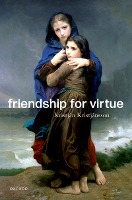Through its revised and applied Aristotelianism, this book illuminates our understanding of friendship in moral philosophy, moral psychology, and moral education. Friendship for Virtue has four main aims. The first is to give the virtue of friendship the pride of place it deserves in contemporary Aristotle-inspired virtue ethics. The second is to integrate Aristotelian theory with recent social scientific research on friendship through mutual adjustments. The third is to retrieve Aristotelian friendship as a moral educational concept, where 'friendship for virtue' is to be understood as 'friendship for virtue development'. The fourth is to offer a more detailed and realistic account than Aristotle did of why even the best of friendships can go stale and dissolve and why the human relationships they represent are so precarious - for example in circumstances where erotic love and friendship clash.

